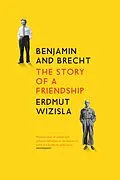Germany in the mid 1920s, a place and time of looming turmoil, brought together Walter Benjamin-acclaimed critic and extraordinary literary theorist-and Bertolt Brecht, one of the twentieth century's most influential playwrights. It was a friendship that would shape their writing for the rest of their lives.
In this groundbreaking work, Erdmut Wizisla explores what this relationship meant for them personally and professionally, as well as the effect it had on those around them. From the first meeting between Benjamin and Brecht to their experiences in exile, these eventful lives are illuminated by personal correspondence, journal entries and private miscellany-including previously unpublished materials-detailing the friends' electric discussions of their collaboration. Wizisla delves into the archives of other luminaries in the distinguished constellation of writers and artists in Weimar Germany, which included Margarete Steffin, Theodor Adorno, Ernst Bloch and Hannah Arendt. Wizisla's account of this friendship opens a window on nearly two decades of European intellectual life.
Autorentext
Erdmut Wizisla is the director of the Walter Benjamin Archives at the Akademie der K nste Berlin. He is currently an Honorary Professor at the Faculty of German Literature at the Humboldt University of Berlin.
Klappentext
Erdmut Wizisla's groundbreaking work explores the important friendship between Walter Benjamin, the acclaimed critic and literary theorist, and Bertolt Brecht, one of the twentieth century's most influential playwrights, directors and poets, during the crucial interwar years. From the first meeting between Benjamin and Brecht to their experiences in exile, the events in this friendship are illuminated by personal correspondence, journal entries, and notes-including previously unpublished materi-als-from the friends' electric discussions of shared projects. Wizisla's examination of the friendship between Benjamin and Brecht, two artists at the height of their creative powers during a time of great political crisis, throws light on nearly two decades of European intellectual life.
